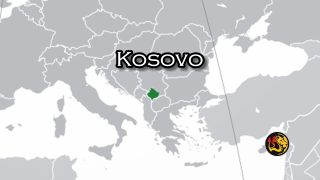
By Stefan J. Bos, Chief International Correspondent Worthy News
PRISTINA/BUDAPEST (Worthy News) – The people of Kosovo began voting Sunday in an election that analysts say could mark another milestone in the young country’s history as it may determine its future territorial integrity in an increasingly volatile region. Yet the vote was overshadowed by ethnic tensions between the Albanian majority and minority Serbs.
Camera crews struggle to get a glimpse of Kosovo’s Prime Minister Albin Kurti as he cast his ballot in the parliamentary election of this small but strategic Balkan nation of 1.6 million people.
Opinion polls suggested that his nationalist Vetëvendosje (Self-determination) party would receive the most votes but not enough to form a majority government.
Yet Kurti already warned he wasn’t interested in a coalition with any significant opposition parties, suggesting more political turmoil in Kosovo.
Polls appeared to show that many voters are pleased that Kurti, who led the government since 2021, succeeded where his predecessors failed: He tightened the control of the Albanian-majority government over a rebellious Serb area on its northern border.
Kosovo’s ethnically mainly Orthodox Serb minority is variously estimated to be 4 to 8 percent of the population, and many remain loyal to Belgrade rather than Pristina. The local Serbs’ most significant stronghold is on the north side of the town of Mitrovica near the Serbian border.
DISMANTLING INSTITUTIONS
However, Prime Minister Kurti recently succeeded in deploying Kosovo police, shutting down parallel institutions, and enforcing the use of the euro over the Serbian dinar currency.
And he, with his party, campaigned to dismantle the remaining Serbian institutions in Kosovo while expanding the central government’s reach over Serb-majority areas.
That worries neighboring Serbia, which never recognized Kosovo’s declaration of independence in 2008. The United States and the European Union have expressed concern.
Kosovo also closely watches the U.S. Donald J. Trump’s next move: The last Trump administration backed a plan that would eventually involve the patrician of Kosovo, which Serbia still regards as its province.
Ethnic tensions have overshadowed developments welcomed by the international community, such as the government’s success in radically reducing unemployment, raising the minimum wage, and achieving economic growth above the regional average.
Yet, with ethnic strife rising and Trump in the White House, observers have warned that the U.S. could even withdraw its peacekeepers from Camp Bondsteel in southeastern Kosovo, leaving the country less secure at a crucial time of regional upheaval.
Copyright 1999-2026 Worthy News. This article was originally published on Worthy News and was reproduced with permission.
Latest News from Worthy News
Japan’s first-ever female prime minister was effectively re-elected as her Liberal Democratic Party (LDP) recorded its strongest performance in snap parliamentary elections in the country’s post-war history.
Senior Hamas leader Khaled Mashaal on Sunday reaffirmed the terrorist group’s refusal to disarm, rejecting demands from U.S. President Donald Trump and vowing to continue the fight against Israel.
The U.S. government added $696 billion to the national debt over the past four months, borrowing $94 billion in the month of January alone, the Congressional Budget Office reports.
Anti-ICE protests continued in Minneapolis over the weekend, resulting in dozens of arrests by local law enforcement.
Authorities across North Africa and southern Europe remained on high alert Monday after powerful storms killed numerous people and forced the evacuation of more than 160,000 residents.
Ukraine’s foreign minister has warned that intensified Russian attacks on his country’s energy infrastructure are creating a direct risk of a nuclear incident that could affect all of Europe.
Official results confirmed Monday that Socialist Party candidate António José Seguro won Portugal’s presidential election with 66.7 percent of the vote, defeating André Ventura of the right-wing nationalist Chega (“Enough”) party.







